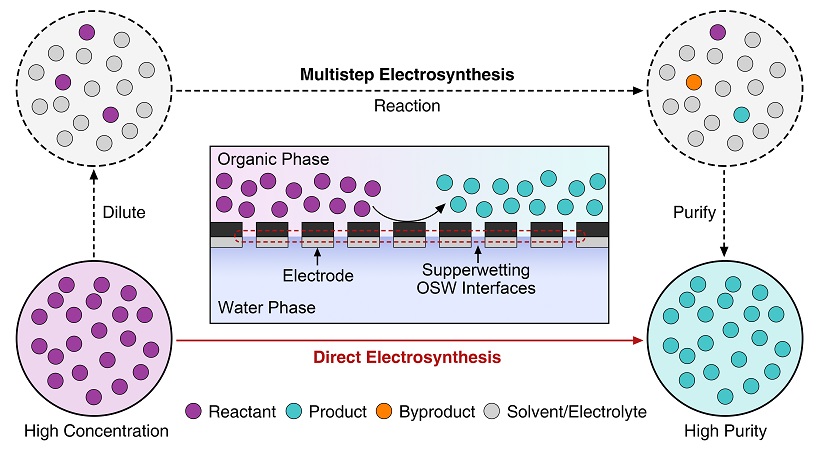Chinese scientists have recently achieved the direct synthesis of high-purity benzaldehyde chemicals from the selective electrooxidation of benzyl alcohol. The organic-solid-water (OSW) three-phase reaction system has shown particular advantages in reducing ohmic losses and simplifying product separation and purification processes compared to conventional H-type electrochemical cells.
The study, published online in Science Advances, was conducted by Profs. ZHANG Tierui and SHI Run from the Technical Institute of Physics and Chemistry of the Chinese Academy of Sciences (CAS).
Electrocatalysis in aqueous electrolyte has been recognized as a green method for organic redox reactions, since water is a clean hydrogen and oxygen resource. However, due to the poor solubility of a variety of organics in the aqueous phase, multistep dilution-reaction-purification processes are required in most cases. As a result, there is still a barrier to the widespread adoption of electrocatalysis within the organic synthesis community.
"For example, the electrooxidation of benzyl alcohol to benzaldehyde typically requires nonaqueous supporting electrolytes and solvents, which significantly increases the reaction overpotential, complicates the purification process, and causes overoxidation to acid during prolonged electrolysis," said Prof. ZHANG Tierui.
"The goal of our research is to develop a three-phase OSW electrocatalytic system for the efficient production of high-purity benzaldehyde. The new system features separate organic and water phases instead of an organic-in-water configuration in conventional H-type cells. It allows rapid supply of concentrated benzyl alcohol directly from the organic phase," said Prof. SHI Run.
In this work, benzyl alcohol (9.3 mol/L) was used at concentrations over 90 times higher than the alcohol used in previous studies. It achieved a 97% Faradaic efficiency for benzaldehyde production and obtained high-purity benzaldehyde (91.7%) in the organic phase without any post-purification processes.
Electrodes with superwetting OSW interfaces can spontaneously separate organic and aqueous solutions. In this case, the benzaldehyde product is collected directly in the organic phase. This has two advantages: suppressing benzaldehyde overoxidation with aqueous electrolyte and obtaining high purity benzaldehyde when benzyl alcohol is completely converted in the organic phase.
Electrosynthesis via superwetting OSW interfaces is therefore a desirable way to produce high-purity organic compounds. Even better, it uses clean energy and water resources, and it makes the reaction more efficient and less complicated.
This work was supported by the National Key Research and Development Program of China, the National Natural Science Foundation of China, and the Project for Young Scientists in Basic Research of CAS.







